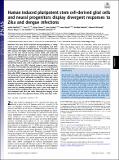| dc.contributor.author | Muffat, Julien | |
| dc.contributor.author | Li, Yun | |
| dc.contributor.author | Omer, Attya | |
| dc.contributor.author | Bakiasi, Grisilda | |
| dc.contributor.author | Richards, Edward | |
| dc.contributor.author | Meyer, Aaron | |
| dc.contributor.author | Jaenisch, Rudolf | |
| dc.contributor.author | Durbin, Ann F | |
| dc.contributor.author | Bosch, Irene | |
| dc.contributor.author | Gehrke, Lee | |
| dc.date.accessioned | 2019-02-22T17:59:00Z | |
| dc.date.available | 2019-02-22T17:59:00Z | |
| dc.date.issued | 2018-05 | |
| dc.date.submitted | 2017-11 | |
| dc.identifier.issn | 0027-8424 | |
| dc.identifier.issn | 1091-6490 | |
| dc.identifier.uri | http://hdl.handle.net/1721.1/120543 | |
| dc.description.abstract | Maternal Zika virus (ZIKV) infection during pregnancy is recognized as the cause of an epidemic of microcephaly and other neurological anomalies in human fetuses. It remains unclear how ZIKV accesses the highly vulnerable population of neural progenitors of the fetal central nervous system (CNS), and which cell types of the CNS may be viral reservoirs. In contrast, the related dengue virus (DENV) does not elicit teratogenicity. To model viral interaction with cells of the fetal CNS in vitro, we investigated the tropism of ZIKV and DENV for different induced pluripotent stem cell-derived human cells, with a particular focus on microglia-like cells. We show that ZIKV infected isogenic neural progenitors, astrocytes, and microglia-like cells (pMGLs), but was only cytotoxic to neural progenitors. Infected glial cells propagated ZIKV and maintained ZIKV load over time, leading to viral spread to susceptible cells. DENV triggered stronger immune responses and could be cleared by neural and glial cells more efficiently. pMGLs, when cocultured with neural spheroids, invaded the tissue and, when infected with ZIKV, initiated neural infection. Since microglia derive from primitive macrophages originating in proximity to the maternal vasculature, they may act as a viral reservoir for ZIKV and establish infection of the fetal brain. Infection of immature neural stem cells by invading microglia may occur in the early stages of pregnancy, before angiogenesis in the brain rudiments. Our data are also consistent with ZIKV and DENV affecting the integrity of the blood–brain barrier, thus allowing infection of the brain later in life. Keywords: Zika; microglia; organoids; interferon; iPS | en_US |
| dc.description.sponsorship | National Institutes of Health (U.S.) (Grant AI100190) | en_US |
| dc.publisher | National Academy of Sciences (U.S.) | en_US |
| dc.relation.isversionof | http://dx.doi.org/10.1073/PNAS.1719266115 | en_US |
| dc.rights | Article is made available in accordance with the publisher's policy and may be subject to US copyright law. Please refer to the publisher's site for terms of use. | en_US |
| dc.source | PNAS | en_US |
| dc.title | Human induced pluripotent stem cell-derived glial cells and neural progenitors display divergent responses to Zika and dengue infections | en_US |
| dc.type | Article | en_US |
| dc.identifier.citation | Muffat, Julien et al. “Human Induced Pluripotent Stem Cell-Derived Glial Cells and Neural Progenitors Display Divergent Responses to Zika and Dengue Infections.” Proceedings of the National Academy of Sciences 115, 27 (June 2018): 7117–7122 © 2018 National Academy of Sciences | en_US |
| dc.contributor.department | Massachusetts Institute of Technology. Institute for Medical Engineering & Science | en_US |
| dc.contributor.department | Massachusetts Institute of Technology. Department of Biology | en_US |
| dc.contributor.department | Koch Institute for Integrative Cancer Research at MIT | en_US |
| dc.contributor.mitauthor | Durbin, Ann F | |
| dc.contributor.mitauthor | Bosch, Irene | |
| dc.contributor.mitauthor | Gehrke, Lee | |
| dc.relation.journal | Proceedings of the National Academy of Sciences | en_US |
| dc.eprint.version | Final published version | en_US |
| dc.type.uri | http://purl.org/eprint/type/JournalArticle | en_US |
| eprint.status | http://purl.org/eprint/status/PeerReviewed | en_US |
| dc.date.updated | 2019-02-08T18:23:05Z | |
| dspace.orderedauthors | Muffat, Julien; Li, Yun; Omer, Attya; Durbin, Ann; Bosch, Irene; Bakiasi, Grisilda; Richards, Edward; Meyer, Aaron; Gehrke, Lee; Jaenisch, Rudolf | en_US |
| dspace.embargo.terms | N | en_US |
| dc.identifier.orcid | https://orcid.org/0000-0002-9387-8212 | |
| mit.license | PUBLISHER_POLICY | en_US |
